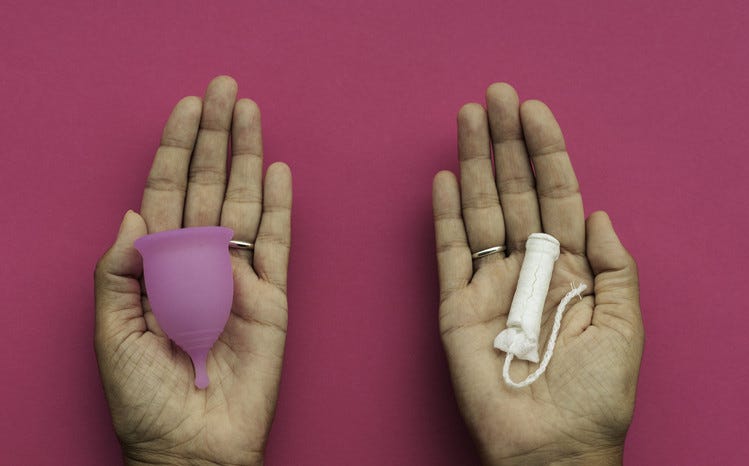Feminine hygiene products are the most essential purchases a consumer can buy. From tampons to pads to liners to period underwear, menstrual products come in many forms, but concerns about safety, toxicity, and sustainability are significant issues. Honestly, this is such a terrible and horrific topic to even be discussing- according to the World Bank, the female population in 2023 was 3,992,233,117 people. Considering a significant part of a woman’s health is menstruation, you’d think that its safety would be a top priority, right? Sadly, most manufacturers don’t disclose the chemicals that their menstrual products contain. Menstrual care product manufacturers don’t have to tell you what’s in their products, just like cosmetics.
Dioxins are a group of chemically related compounds that are persistent environmental pollutants (POPs). They are toxic and can cause reproductive problems, damage the immune system, and come between your hormones. There are also links to cancers like Chronic B-cell leukemias, Hodgkin lymphoma, and non-Hodgkin lymphoma. The World Health Organization (WHO) has recognized this as a problem and supports reducing the amount of dioxin used. The U.S. Food and Drug Administration (FDA) states that tampons do not contain dangerous levels of dioxin. However, keep in mind, that women use menstrual products every month (some more than others, a bleeding period can last from 2-3 days to 8-10 days). Vaginal tissue is more absorptive than other skin in our body. This makes the presence of toxic chemicals more dangerous and concerning. This can lead to rapid exposure and absorption of chemicals. A lower level of dioxin or any chemical doesn’t mean it’s safe. These can add up, think of the long-term effects of these ingredients and additives.
Another chemical is PFAS. PFAS are known as "forever chemicals" because these are found everywhere, even in tap water! However, as commonly known vaginal tissue is more absorptive than other skin including your hands and fingers. They can lead to health problems such as liver damage, thyroid disease, obesity, fertility issues and cancer. And as many argue, “small amounts!” PFAS accumulates in body tissues such as the liver linked to increasing the risks of thyroid cancers. Now imagine those risks with the close contact factor!
What are we Doing About it?
In a lab conducted between 2020 and 2022 by the consumer watchdog site Mamavation and Environmental Health News, it is stated that “48% of sanitary pads, incontinence pads, and panty liners tested were found to contain PFAS, as were 22% of tampons and 65% of period underwear.”
In addition to that, another analysis conducted by Mamavation found that 13 of 18 products that made claims of, “ ‘organic,’ ‘natural,’ ‘non-toxic,’ ‘sustainable,’ or using ‘no harmful chemicals’” tested positive for PFAS. As it feminine hygiene products are considered cosmetic products, there is a lack of government oversight, so companies are not legally required to disclose or list the ingredients used in their products.
What’s even more disgusting is that manufacturers know of this! Many people and organizations (such as the FDA and WHO itself) know of this but don’t raise complaints. And, due to the scarce research in this area, there aren't many clinical studies or even funding to understand the dangers of these chemicals. Furthermore, the U.S. federal government knows of this, as do activists, since 2002!
Now, What’s a Girl to Do?
Menstrual products are as expensive as they are. Menstruation in general is an uncomfortable topic for many people. However, it must be spoken upon, it’s your body after all! Fortunately, there are alternative menstrual care products that are better for the women's body and Mother Earth as well. Some examples are menstrual care products free of bleach, pesticides, and toxic chemicals. In particular, Seventh Generation and Natracare, reusable cloth pads, some period underwear, and silicon and natural rubber cups (like DivaCup and the Keeper) are considered safer.
References
Kluger, J. (2023c, February 9). What to know about pfas chemicals in menstrual products. Time. https://time.com/6254060/pfas-period-chemicals-underwear-tampons/
Menstrual Care Products and toxic chemicals. Safe Cosmetics. (2022a, June 10). https://www.safecosmetics.org/resources/health-science/menstrual-care-products/#:~:text=And%20with%20menstrual%20care%20products,and%20mystery%20%E2%80%9Cfragrance%E2%80%9D%20ingredients.
Zurek, E. (2023b, May 4). Period products can contain hazardous ingredients. some states are requiring more transparent labeling. PBS. https://www.pbs.org/newshour/health/period-products-can-contain-hazardous-ingredients-some-states-are-requiring-more-transparent-labeling
Written by Pooja Gopinathrao from MEDILOQUY




